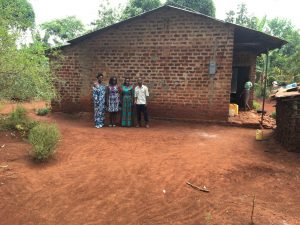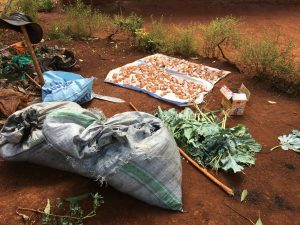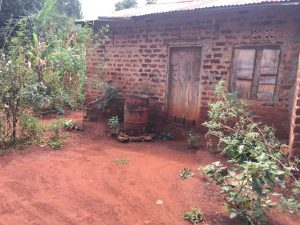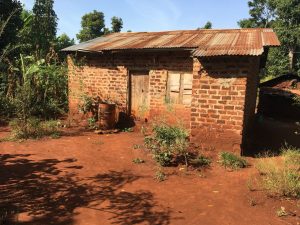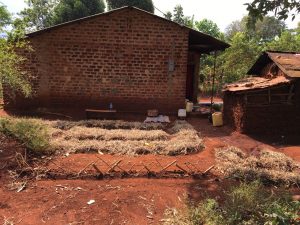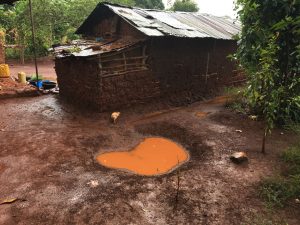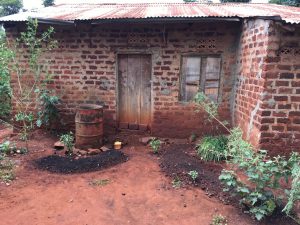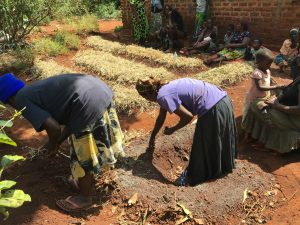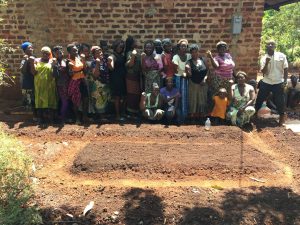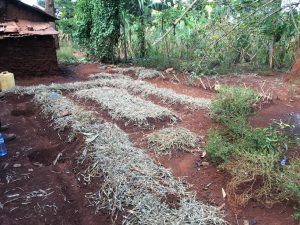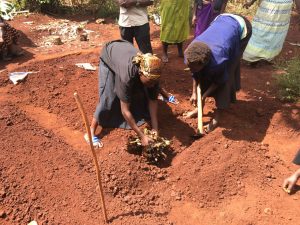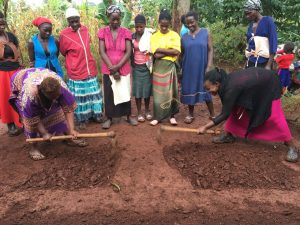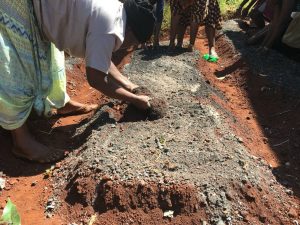This project is made possible through the partnership of WATER CHARITY and the NATIONAL PEACE CORPS ASSOCIATION. ![]()
This project has been completed. To read about the conclusion, CLICK HERE.
The ninth training of our Permagarden Training Initiative – Worldwide will take place in July, 2018. Peter Jensen will train community volunteers with his Terra Firma Permagardens for Empowerment and Resilience course. Here is an outline of what will be accomplished in the training.
What:
To provide a complete, hands-on, Four Day Terra Firma Permagarden Creation and Outreach Training
Trainer:
Peter Jensen, RPCV (Haiti, 1985-87), Agroecology and Permagarden Training Specialist. Peter will be working with Gerald Nkusi, ALCDI Uganda, as a training assistant and co-facilitator.
Host and Local Direction:
Hellen Tanyinga, Executive Director, Rape Hurts Foundation, a nonprofit, non-government organization working with marginalized groups of people, especially rural women and children in Uganda.
Where:
Jinja, Uganda
When:
July 8 to July 14, 2018
Who:
25 community outreach volunteers of Rape Hurts Foundation
Summary:
As reported by Peter:
We are now in a small village outside Jinja with the Rape Hurts Foundation. We will be providing a complete Terra Firma Permagarden and Keyhole training with 25 women. All are victims of gender-based violence and are working through the challenges this has brought them. It is our hope and vision that growing a year-round vegetable garden will also bring a sense of control and accomplishment to their lives. With this group we are moving beyond mere nutrition and entering the realm of psychosocial support and empowerment through the practical steps of water capture, management, soil health and intensive crop production.
We have found an excellent site for this training at one of the neighbor’s homes. A family of four women live in this house along with 3 children. The house is clean and well cared for but the surrounding landscape is constantly under threat from pounding rain or searing sunlight so little will grow. The soil is compacted and infertile. But, all this can be changed through the small doable action steps of Terra Firma in a short period of time. Once experienced, the women will be able to replicate these simple steps at their own homes and serve as advocates and educators in their respective neighborhoods surrounding the RHF headquarters and farm.
The Group: 25 ‘victors’ over Gender Based Violence stand ready to become victors over climate change, hunger and poverty by learning how to control the unstoppable force of runoff water. This joined pathway is the ideal symbol of power and strength. It is where the waters join in strength, so it is also the place where these women will join in strength to control it.
Potential Garden Spot Before: This area of hard baked infertile ground close to the home has everything we need to convert it into a climate-smart, nutrition-focused Permanent Garden: Sun, Soil, Slope and Source.
Local Materials: Everything we need to improve the quality, water retention, fertility and overall health of this soil is found within the area. The key feature of the Terra Firma Method is that nothing is imported. As soon as something must be imported, the chain of replication by others is broken. Here we have eggshells, charcoal, manure, wood ash, and green and brown leaves ready to be captured and used properly and sustainably.
Water Capture: There is already a small drum to catch some runoff which is a great sign that this family is already aware of the potential for water capture. The area around the container can be modified to include a small culinary herb garden which will catch and retain the overflow.
Opportunities: This back side of the house has everything needed to grow a tremendous amount of food; if the water can be controlled and the soil improved.
Follow-up within 3 months of training will be reported to show onward adoption of this simple yet empowering methodology. 60 home gardens are anticipated within this first period, benefiting 7 people per garden, for an expected total of over 400 persons. A full year later this figure will be expected to be near 200 gardens, resulting in an outreach to over 1,500.
The funds for this project have been provided by an anonymous donor. Your donation using the button below will be used for the next Perma garden project.
 Conclusion of Rape Hurts Permagarden Training – Uganda
Conclusion of Rape Hurts Permagarden Training – Uganda
This project has been completed under the direction of Peter Jensen, Agroecology and Permagarden Training Specialist. The training was hosted and locally organized by Hellen Tanyinga, Executive Director, Rape Hurts Foundation. Gerald Nkusi, ALCDI Uganda, worked as a training assistant and co-facilitator.
To read about the start of the project, CLICK HERE.
Peter reports:
What a pleasure it was to work with such a powerful and dynamic group as this. These 25 women came with their children over 4 days, and despite interruptions by Local Council Elections and a very heavy but extremely informative rain shower, created a fully intact Permagarden and 3 Keyholes with inspiring energy and enthusiasm. These are not victims of gender-based violence or climate change, rather, they are empowered victors over both. I look forward to following their outreach efforts at their own homes and at those of their neighbors in these coming few weeks before the heavy rains return again.
As with the other groups we have trained, this group form Rape Hurts Foundation appreciates the concept of building an ‘eating water tank’ outside every house and making the small keyhole gardens near as many corners as possible. The pictures that follow show the stunning transformation of an overswept compacted soil to a rich, healthy topsoil able receive and hold huge amounts of runoff water for the months in between the rains. It is in this way that our goal of daily complementary nutrition can be achieved.
Complete Garden After: What had before been an overswept ‘waste’ area of compacted B horizon has been transformed into this ‘eating water tank’ able to direct and absorb all the water off of the roof of the main house while growing nutrient-dense vegetables year-round. Note the completed Keyhole garden on the lower right which now catches and nourishes the soil of two double dug garden beds. Compare this to the same area immediately after an intense shower.
Kitchen Keyhole Before: This hole was already in place having been the source of heavy clay for brick making. Through simple planning, this water, when it falls, can be put to much greater use by the family.
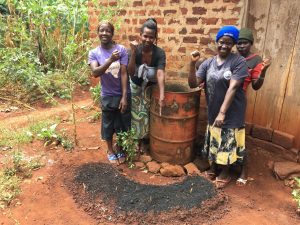
Barrel Keyhole: Following a simple site assessment these women employed all the water capture and soil improvement lessons they had just learned as part of the larger permagarden training. The difference here being that only a small section of formerly wasted land is required taking them just 30 minutes to complete this small garden bed which was planted with lemongrass and cowpeas.
Captured Resource: The area that used to flood during heavy rains (the pathway leading to the door) is now a source of water management lessons and green vegetables year-round. Simple steps and the skills on how to use the existing resources all around us are key to the success of home gardening here.
Keyhole Planting: The kitchen keyhole can be easily planted once the soil has been improved with dry carbon materials and other ‘wastes’ formerly disregarded.
The Group After: Before being planted and mulched the group showed their feeling of power over the rain and hunger! These powerful women are no longer victims; they are VICTORS!!
Swale: The most important feature of the Permagarden to come is the water management swale and berm. This acts in the same way as a roof gutter as it directs the runoff water into the tank, which in this case, is the subsoil itself.
Subsoil Feeding: Using only those materials which are already locally accessible, each garden bed and berm is double dug and amended deeply so as to increase soil health, productivity and water holding capacity. Once the subsoil has been ‘fed’ like this it never needs to be done again so long as topsoil feeding and crop rotation and general management is continued throughout the year.
Garden Bed Design: Meter wide beds and slightly narrower berms are designed for easy management and water capture. It is also a highly social activity which appeals to so many in this community.
Topsoil Feeding: A rich assortment of local wastes (wood ash, charcoal, egg shells and forest soil) are mixed into the top 20 centimeters to enrich the root zone of the soon to emerge seedlings.
We extend our thanks to Peter for completing this important project.
